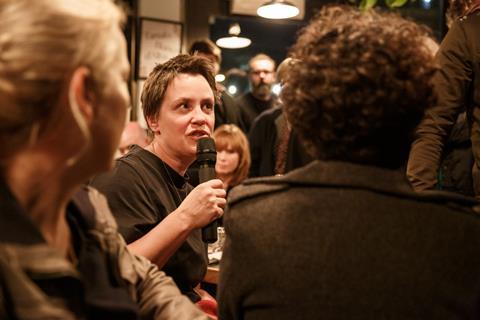Nicholas Boys Smith says planning system got ’confused’ following World War II
The leader of the government’s new quango responsible for housing design standards has said the UK had been “confused” about planning regulations since the Second World War and called for a return to a Victorian system.
Create Streets founder Nicholas Boys Smith, who co-chaired the government’s Building Better Building Beautiful Commission with the late Roger Scruton, said that “organic learnings” had been rejected in the post-war era in a drive to reject the pre-war past.
Speaking during a panel discussion on the future of housing at the Conservative party conference, he said: “For generations across cities we’ve been broadly getting this right and about 60 or 70 years ago a range of things sort of got us all a bit confused.”

Arguing that the invention of the car had resulted in traffic dominating town and city centres, he said that humans needed to come first.
He added: “We learned technically how to build enormous sheds very cheaply, and we possibly rejected some of the organic learnings from towns and cities over millennia in an understandable desire to reject the past immediately post-war.”
He said that post-war planning rules had entangled the planning and regulatory systems, and there was now a “shift back” to a more Victorian separation of the two systems in this government’s planning reforms.
He explained: “We’ve got confused about the role of planning and the role of regulation, and we’ve put into planning things which should just be regulatory, that certainly always used to be regulatory.
“So if you look at the 18th- or 19th-century building acts, all of the public health acts of the late 19th century – lots of the things that we now put in the planning system were essentially in the regulatory system as it was then,” he said.
“And those include fundamental impacts on the lives we lead, the size of our homes and the connectedness and the meaningfulness of the lives that we can lead in them and in the places that they create. So I think there’s a shift back to that.”
If you put the most perfect passive house in the middle of nowhere so you have to drive there, you’re not creating an environmentally friendly house
Nicholas Boys Smith
Building safety minister Stephen Greenhalgh, who was also on the discussion panel, said the government was “taking the right steps” to separate the two systems.
The appointment of Boys Smith to the government’s as-yet unnamed quango last month caused a stir among architects, with many expressing unease at Create Streets’ design agenda.
But housing secretary Robert Jenrick said that Boys Smith had established himself as “the pre-eminent voice in the movement to create beautiful, sustainable neighbourhoods with an enduring appeal”.
Later in the discussion, Boys Smith criticised clients who commission energy-efficient homes without taking into consideration the lifestyle which the homes might promote.
He said: “If you put the most perfect passive house, e-house, everything else, all bells and whistles, in the middle of nowhere so you have to drive there, you’re not creating an environmentally friendly house, you’re just creating an energy-efficient house and a non-energy-efficient lifestyle.
“It isn’t just the physical fabric of the house, it’s the physical fabric of the place around the house that we create or that we sustain.

“It’s too easy for the environmental debate to get waylaid into the sort of bells and whistles and the stuff that someone sells you, rather than the actual lifestyle that we lead around it.”
His comments echoed those of architect Annalie Riches of Mikhail Riches, which won last year’s Stirling Prize for Goldsmith Street, the Passivhaus social housing scheme in Norwich.
At a Negroni Talks debate a year ago she called for a carbon tax on car-dependent housing to discourage housebuilders from building dislocated suburbs on greenfield sites.
She said: “I am absolutely frustrated that the volume housebuilders are allowed to build in locations that are absolutely reliant on car use. The carbon impact of those kind of designs, making everyone have to get into their car to travel anywhere… If they could be taxed on the carbon linked to their design then it would be a massive change because they’d have to design them near public transport, for instance. We just need to tax them.”
>> Also read: Stirling Prize-winner calls for carbon tax on car-dependent housing
Riches isalso part of the VeoCity team that won the National Infrastructure Commission ideas competition for a development corridor linking Oxford and Cambridge in 2017 with an entry that focused on creating new villages near stations connected by walking and cycling routes.















6 Readers' comments